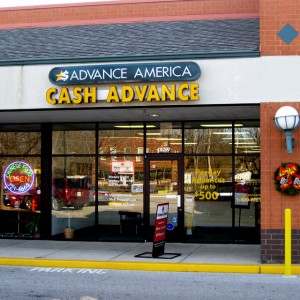First Premier Bank has just introduced its new 79% interest rate sub-prime credit card. No, that’s not a typo, and some experts expect to see more credit cards with sky-high interest.
Which makes me again bring up the topic of a national usury cap. Thomas Geoghegan recommended such a cap last year, in his article in The American Prospect. He suggested a credit card interest cap of 12% and a law completely barring payday loans.
I have filed several class action suits against large payday lenders (here’s a post on one of those suits). These lenders often argue that people need these 400% interest loans for short term emergencies. At what cost, though? In my experience, these lenders are commonly stretching out these “short term” loans for many months. People who borrow $500 will pay $2000 in interest over the year and they will STILL OWE THE $500.
Many states allow payday lenders to charge in excess of 1000% interest. These loans suck the very life out of working class folks. They amount to financial crack cocaine, because people often end up taking out a second, and a third payday loan in order to pay off the first one. It’s a terrible mess and it’s ruining lives. That’s why 13 states have passed laws making sure that payday lenders cannot operate in those jurisdictions. It’s time for the other states, and Congress, to get with the program.
To put this all in perspective, remember the stories about “loan sharks?” Those were the good old days. “Simple nominal annual interest rates on extortionate mafia loan shark debts averaged 250%.” Syndicate Loan-Shark Activities and New York’s Usury Statute, 66 Colum. L. Rev. 167, 167 (1966).
And here’s another irony. The Bible clearly holds that usury is a sin comparable to murder. Usury is prohibited by Exodus 22:25: “If thou lend money to any of my people that is poor by thee, thou shalt not be to him as an usurer, neither shalt thou lay upon him usury.” Usury is also prohibited by Leviticus 25:35-37. In spite of these Bible quotes, if you want to find lots of payday stores and payday lenders, look for geographical areas where you’ll also find  conservative Christians. That is the finding of Steven M. Graves and Christopher Peterson, in a law review article entitled “Usury Law and the Christian Right: Faith-Based Political Power and the Geography of American Payday Loan Regulation,” 57 Cath. U. L. Rev. 637, 640 (2008):
conservative Christians. That is the finding of Steven M. Graves and Christopher Peterson, in a law review article entitled “Usury Law and the Christian Right: Faith-Based Political Power and the Geography of American Payday Loan Regulation,” 57 Cath. U. L. Rev. 637, 640 (2008):
We conclude, with a high degree of statistical certainty, that states with powerful conservative Christian populations tend to host relatively greater numbers of payday loan locations per capita as well as a greater commercial density of payday lenders. These findings propound a tragic and sad irony. Those states that have most ardently held to their pious Christian traditions have tended to become more infested with the progeny of money changers once expelled by Christ from the Hebrew temple. Legislators in those states, who have effectively used biblical principles to shape their legislative agenda on social and cultural issues, have failed to consistently apply biblical principles to economic legislation.
All it would take for Congress to outlaw payday loans is to write up a bill, have a majority of members of Congress approve of it, and then refer it to the President to sign it. But that can’t happen these days because the financial services industry pays our politicians huge amounts of money so that they WON’T sign these sorts of bills. And, of course, with regard to Congress, the banks “frankly own the place.”


BTW, Payday lenders now have more storefronts in the United States than McDonald's and Starbucks
combined.
This statistics is from an article by Paige Marta Skiba and Jeremy Tobacman entitled "Do Payday Loans Cause Bankruptcy?" (This answer is that signing up for a $300 payday loan increases the two-year Chapter 13 bankruptcy filing rate by 2.48 percent. This is rather amazing that a $300 loan could affect bankruptcies at all, but these payday loan customers are already financially stressed, and it is terribly difficult for them to get out of the payday loan cycle, where the principal is tiny compared to the interest rate makes us think of loan shark loans as the good old days.
Perhaps you're wondering why there are no meaningful usury laws pertaining to any banks operating in the United States. After all, there used to be enforceable usury laws in most states, and these laws severely capped the interest a bank could charge. But those laws, even though they are still on the books, are no longer enforceable. Law professor Chris Peterson succinctly explains this modern absence of usury restrictions in his comprehensive 2008 law review article.
USURY LAW, PAYDAY LOANS, AND STATUTORY SLEIGHT OF HAND: SALIENCE DISTORTION IN AMERICAN CREDIT PRICING LIMITS, April, 2008 (92 Minn. L. Rev. 1110, 1121 -1122 (2008).
Peterson argues that state legislatures engaged in misleading practices, using "small, innocuous numbers in usury laws in an attempt to minimize the public and media outcry over their decisions to legalize triple-digit interest rate loans."
He advocates a 36% annual percentage rate price limit–the 1965 national median–as a new usury limit, and further advocates that this limit whoudl apply to all lenders, "irrespective of their mission, charter, or ownership."
Barring usury would be one of the best forms of legislation that could ever be passed. Their contribution to society is minimal, their cost is high in the forms of bankruptcy and broken lives.
Of course if the lending companies had it their way, indentured servitude would be reintroduced.